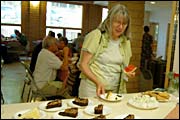Midweek church nights build spirit
Dinner, programs, and worship for all ages bring people together on weeknights.
Wonderful Wednesdays—dinner and vespers, then a choice of adult courses and workshops, with free child care—is an exemplary approach to a phenomenon that more and more Unitarian Universalist congregations are finding enriching: packing a lot of church into one midweek night, usually Wednesday, to offer members and friends easy access to a lot of meaning. The practice is more common in larger congregations like UUCA—which typically draws about 120 people to its Wonderful Wednesdays—but smaller congregations are finding that the concentrated church evenings work for them, too.
Congregations across the country report experiencing the same range of benefits—stronger connections and deeper religious lives for members and friends; greater ease for new people in finding their place; and a respite for people with busy lives. Sometimes particular programs are a magnet for new people. “It just provides so much energy,” says the Rev. Roger Butts, minister of the 207-member Unitarian Church of Davenport, Iowa.
The concentrated church evenings almost always include several choices of adult religious education spanning many interests that differ from congregation to congregation and season to season: Building Your Own Theology, films with religious and social justice themes, yoga, introduction to small group ministry, teen-parent workshops, spiritual practices, discussions of global and social issues, and knitting circles.
Every church has its own approach, depending on the passions and skills of ministers and members who help lead their classes and workshops. For example, the passion of member Chuck Berry ensures that the regular Wednesday night adult program at the UU Fellowship of Centre County in State College, Pennsylvania, always includes board games carefully selected to encourage cooperation among players, in tune with UU values. Berry reports that some people have joined the congregation after first coming for the games.
Programming in Davenport, Butts says, is all about faith development. Recent programs included a class called Living the Questions. “We try to make sure that everything we offer gives material for daily home reflection,” he says. “This reminds us that what we do is not just about our brains, it’s about growing our hearts.” On a recent Wednesday twenty-two children under 5 were in the nursery while their parents were attending workshops—and some of the children’s parents were community people drawn to the church by a program called Love and Logic for Parents.
The value of the concentrated midweek programming, says the Rev. Christopher Craethnenn, minister of religious education at the UU Church of Berkeley in Kensington, California, is that it creates what he calls “moments of intimacy in a large congregation.”
This extends to new people. Many come to a Thursday night after their first visit on a Sunday, and it helps them get to know people and find a place to be comfortable.
Craethnenn reports that his congregation finds its Thursday night programming so valuable that they just keep adding to it. A recent addition was moving practice for the youth and children’s choirs to 5 p.m., followed by social time at 5:30 before announcements are made and a catered dinner is served at 6. “This made our evenings truly intergenerational,” he says. “We have people of all ages now.” Worship is at 7, and at 7:30 the adult programming begins—along with church meetings and choir practice. The congregation often offers other adult programs at other times, and sometimes does special programs for the choir and others whose activities keep them away from church-night programs. Small ministry groups meet both before and after the Thursday dinner.
Bay Area traffic being what it is, people sometimes have to drive for an hour to get to the church, so the Berkeley congregation understands that people are likelier to come if they can get a lot of value for their investment of travel time. “It’s very practical,” Craethnenn said: “an easy meal and free child care while the adults are together.”
UUCA’s program is in many ways typical: dinner is served at 6:15 p.m., lay-led vespers start at 7, and adult religious education programs start at 7:30, with child care available. “It’s great for families with kids,” says Chance Hunter, the congregation’s welcome ministries coordinator. “It’s a meal you don’t have to cook.”
The Atlanta congregation is unusual in that groups within the church volunteer to cook the dinners as a way to raise money for their projects and causes, as Yamashita and his young compatriots did, or to raise awareness of their roles—the endowment committee is a regular, for example. Other congregations hire caterers or run potlucks or skip dinner and just serve dessert and coffee before vespers. Some do vespers after the classes, as a way to end the evening, and others don’t include vespers—in true UU fashion, congregations fit their approach to their own cultures.
Prices for the meals vary from zero for potlucks to $9 for a catered dinner in Berkeley. UUCA charges $6 for adults and $3 for children, with a maximum of $15 per family. The congregation is typical in ensuring that vegetarian alternatives are always available—its annual pancake dinner included quiches (baked by parents) and both meat and veggie bacon and sausage, plus a giant fruit salad prepared by a mother and daughter team.
Which brings us back to Michael Yamashita, the church volunteer. Did he just work in the kitchen, or did he get to eat some of the pancakes?
“Yeah, I ate a lot!”
See sidebar for links to related resource.








